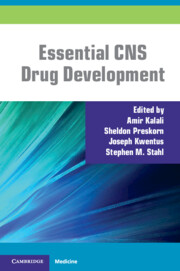Book contents
- Essential CNS Drug Development
- Essential CNS Drug Development
- Copyright page
- Contents
- Contributors
- Preface
- Chapter 1 History of CNS drug development
- Chapter 2 Regulatory issues
- Chapter 3 Essential CNS drug development – pre-clinical development
- Chapter 4 Phase I trials: from traditional to newer approaches
- Chapter 5 Phase II development and the path to personalized medicine in CNS disease
- Chapter 6 CNS drug development – Phase III
- Chapter 7 Statistics issues relevant to CNS drug development
- Chapter 8 Clinical trials management at company level
- Chapter 9 Clinical trials management at the site level
- Chapter 10 Medical writing for CNS indications
- Chapter 11 Dissemination of clinical trial information: multiple audiences, multiple formats
- Chapter 12 The importance of treating cognition in schizophrenia and other severe mental illnesses: background, strategies, and findings to date
- Chapter 13 Leveraging disruptive technologies to drive innovation in CNS clinical drug development
- Index
Chapter 5 - Phase II development and the path to personalized medicine in CNS disease
Published online by Cambridge University Press: 05 July 2012
- Essential CNS Drug Development
- Essential CNS Drug Development
- Copyright page
- Contents
- Contributors
- Preface
- Chapter 1 History of CNS drug development
- Chapter 2 Regulatory issues
- Chapter 3 Essential CNS drug development – pre-clinical development
- Chapter 4 Phase I trials: from traditional to newer approaches
- Chapter 5 Phase II development and the path to personalized medicine in CNS disease
- Chapter 6 CNS drug development – Phase III
- Chapter 7 Statistics issues relevant to CNS drug development
- Chapter 8 Clinical trials management at company level
- Chapter 9 Clinical trials management at the site level
- Chapter 10 Medical writing for CNS indications
- Chapter 11 Dissemination of clinical trial information: multiple audiences, multiple formats
- Chapter 12 The importance of treating cognition in schizophrenia and other severe mental illnesses: background, strategies, and findings to date
- Chapter 13 Leveraging disruptive technologies to drive innovation in CNS clinical drug development
- Index
Summary
- Type
- Chapter
- Information
- Essential CNS Drug Development , pp. 70 - 91Publisher: Cambridge University PressPrint publication year: 2012



